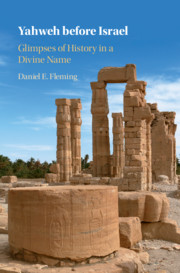Book contents
- Yahweh before Israel
- Yahweh before Israel
- Copyright page
- Dedication
- Contents
- Figures
- Preface
- Acknowledgments
- Abbreviations
- 1 Introduction
- 2 Yhwʒ of Shasu-Land
- 3 The Midianite Hypothesis
- 4 The Old Poetry
- 5 The Name Yahweh
- 6 The People of Yahweh
- 7 The Early Character of the God Yahweh
- Bibliography
- Ancient Near East Index
- Scripture Index
- Subject Index
5 - The Name Yahweh
Published online by Cambridge University Press: 17 November 2020
- Yahweh before Israel
- Yahweh before Israel
- Copyright page
- Dedication
- Contents
- Figures
- Preface
- Acknowledgments
- Abbreviations
- 1 Introduction
- 2 Yhwʒ of Shasu-Land
- 3 The Midianite Hypothesis
- 4 The Old Poetry
- 5 The Name Yahweh
- 6 The People of Yahweh
- 7 The Early Character of the God Yahweh
- Bibliography
- Ancient Near East Index
- Scripture Index
- Subject Index
Summary
In support of a Midianite Hypothesis, long-standing interpretation of both prose and poetic biblical texts has found in them reflections of Yahweh’s origins outside Israel and Judah among desert peoples that once lived to the south. I have concluded in Chapters 3 and 4 that while both sets of material reflect a persistent and perhaps surprising sense of kinship with such pastoralist neighbors, the texts do not indicate that these were the first peoples to worship Yahweh. Before weighing the biblical material, I undertook in Chapter 2 to reexamine the oldest evidence brought to bear on the name Yahweh, the Yhwʒ component of “Shasu-land” in Egyptian geographical lists from the 14th and 13th centuries. This evidence places us among just such a population evoked by the Bible, though without a particularly southern location, and yet Yhwʒ does not name a god, at least by its primary and only explicit application.
- Type
- Chapter
- Information
- Yahweh before IsraelGlimpses of History in a Divine Name, pp. 162 - 184Publisher: Cambridge University PressPrint publication year: 2020

